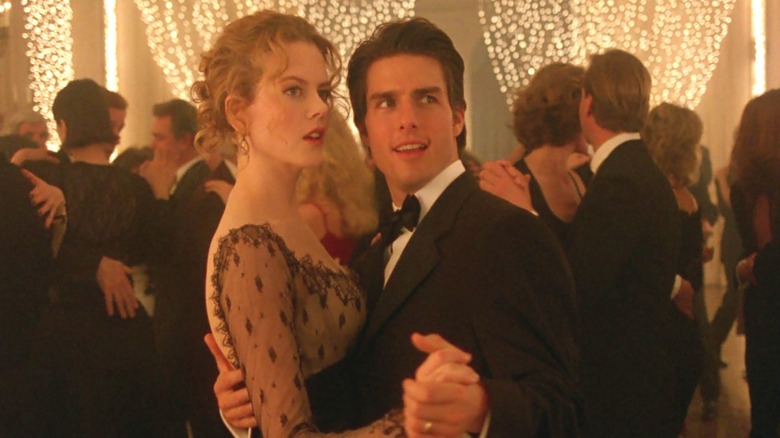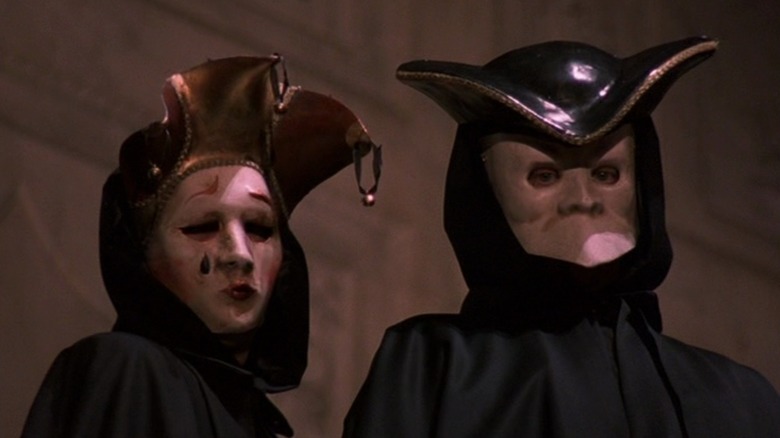The Eyes Wide Shut Changes That Saved The Movie From Being Rated NC-17
One of the most celebrated films from the '90s, "Eyes Wide Shut" could have been different if not for one key change. Directed by Stanley Kubrick, the picture follows Tom Cruise's character trying to navigate the dangers of a secret society who participate in masked, ritualistic orgies. One of Kubrick's most daring pictures, "Eyes Wide Shut" was also his last, with the film being released just months after his passing in 1999. When the film was delivered to the Motion Picture Association, it was given an NC-17 rating because of its graphic sex scenes in an orgy sequence.
With no input from Kubrick possible, Warner Bros. digitally altered several nude individuals in the sequence to give the film a more viable R rating. Around 65 seconds were altered. Essentially, Warner Bros. tamed down the film's themes, namely the expression of human sexuality, blocking out some of the more graphic sequences — something Kubrick likely would not have done. It's no secret that Kubrick was a radical perfectionist who was obsessed with the power of small details. The director was particularly obsessive over his final film, going as far as to keep Cruise and Nicole Kidman apart to preserve their characters' dynamic in "Eyes Wide Shut."
In recent years, a decent amount of misinformation has manifested surrounding the film. Rumors frequently claim that Warner Bros. removed a substantial amount of scenes, suggesting that "Eyes Wide Shut" wasn't the film Kubrick intended for audiences to see. While there's not much truth to those claims, Kubrick was known to make edits to his films up to the last minute.
Critics argue that Eyes Wide Shut should have remained NC-17
When it was announced that Warner Bros. would be altering "Eyes Wide Shut" to achieve an R rating, many critics came out to criticize the Motion Picture Association's original NC-17 decision. Both New York- and Los Angeles-based critics demeaned the board for not allowing Stanley Kubrick's final film to be seen in its intended form over something as simple as human sexuality.
Terry Semel, then co-chairman of Warner Bros., defended the decision to alter the film, saying, "We're not in the NC-17 business. When one looks at 'Eyes Wide Shut' perhaps there was not a huge difference between what would be an R, what would be an NC-17" (via The New York Times). Semel continued by saying that NC-17 films include pornographic pictures, something that Warner Bros. isn't interested in releasing. In Semel's defense, Kubrick was contractually obligated to deliver an R-rated picture, but seeing as Kubrick was — well — Kubrick, it's difficult to know what the director would have done if he was alive.
Filmmakers have always made changes to their films to appease the MPA and studios — Quentin Tarantino notably had to cut a scene from "Pulp Fiction" to avoid an NC-17 rating. Financially, R-rated pictures are far more marketable and culturally palatable than NC-17 films, which are largely considered obscure (some theaters don't even screen them, considering them a death sentence). Take a look at the highest-grossing NC-17 films at the box office, and it's clear that their financial hauls simply don't match R-rated films. With an R rating, "Eyes Wide Shut" would go on to become a mild hit, making $162 million worldwide.

